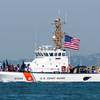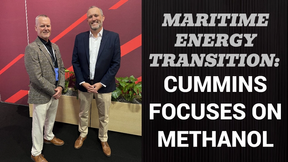Maritime Security Initiative Launched
Murray, a member of the Senate Appropriations Subcommittee on Homeland Security, and Collins, Chairman of the full Senate Homeland Security Committee, co-authored the bill to improve the security of the millions of cargo containers that enter America's ports unchecked each year. Senators Norm Coleman (R-MN) and Joseph Lieberman (D-CT) are original cosponsors of this legislation.
The nation's current cargo security regime was built pre-9/11, with an emphasis on efficiency but not on security. At present, opportunities for terrorists to tamper with cargo exist at every step along the supply chain. Terrorist organizations could use containers to smuggle weapons or terrorists into the United States, or could turn a container into a weapon by detonating a conventional, chemical, biological or nuclear weapon within a container once it arrives on American shores.
"Right now, there is a gaping hole in America's security when it comes to the cargo entering our ports each day," Murray said. "To protect our nation we have to develop a cargo security system that closes vulnerabilities, provides a way to resume trade after an incident, and maintains the efficient flow of commerce. Our GreenLane bill addresses these issues, taking into account the input of all the key stakeholders and experts, and I want to thank Senator Collins for her hard work and cooperation in helping to write this bill and get it introduced in the Senate."
“Coming from a state with three international cargo ports, I am keenly aware of the importance of our seaports to our national economy and to the communities in which they are located. In addition to our ports’ economic significance, the link between maritime security and our national security is evident,” Senator Collins said. “The global maritime industry is crucial to our nation’s economy, and our cargo ports are undeniably on the front lines of the war against terrorism. This legislation sets clear goals for improving the security of this vital sector, and it provides the resources to meet those goals.”
An attack launched on, or through, America's seaports could result in significant loss of life and the crippling of our economy. Consequently, since 9/11, experts have been calling for an upgraded security system for shipping containers. The Murray-Collins bill builds on the lessons from the 9/11 Commission, GAO investigations, and other reports to protect against the human and economic costs of a terrorist attack through our ports. The GreenLane Maritime Cargo Security Act Will:
· Protect Americans by making our cargo and seaports more secure - mitigating a dangerous vulnerability.
· Prevent a lengthy shutdown of America's seaports in the event of an incident – protecting America's economy from severe disruption.
· Provide layered security at every step of the supply chain while keeping it efficient.
· Push the borders out and reduce the haystack so we can focus our limited resources on suspect cargo. The bill improves security at America's ports by establishing:
· The GreenLane, comprised of supply chain participants who voluntarily meet the highest level of security, allows our security services to better identify and respond to potential threats and provides real incentives to importers to enhance their supply chain security measures.
· Minimum security standards for all cargo containers entering the U.S. and requirements that strengthen current cargo security programs.
· The Office of Cargo Security Policy to ensure accountability and coordination of cargo security policies, procedures & regulations at the Department of Homeland Security and with other agencies.
· Joint Operations Centers to ensure a coordinated, measured response and the resumption and flow of commerce in the event of an incident or heightened national security threat level.
· The Act also Authorizes Port Security Grants, the Container Security Initiative and C-TPAT. The bipartisan proposal will be introduced in the Senate today. Noted homeland security expert Dr. Stephen Flynn praised the bill.
"The GreenLane Maritime Cargo Security Enhancement Act of 2005 is the most comprehensive legislative initiative to date to tackle the challenge of ensuring that an intermodal container is not used as a poor man's missile. It redresses many of the well-documented weaknesses of the C-TPAT and CSI programs and provides a framework for rewarding private sector players who work with DHS to raise the security bar," Dr. Flynn said. "I applaud Senator Collins and Senator Murray for providing such timely bipartisan leadership on this critical issue. This bill should be placed at the top of the docket of the 109th Congress and embraced by the White House as advancing the cargo security elements of its new National Maritime Security Strategy."
"The economic consequences of a terrorist attack which exploits any vulnerabilities in any commercial supply chain are enormous," said Senator Lieberman. "Yet DHS has been slow to address those vulnerabilities. The GreenLane Maritime Cargo Security Act will strengthen underlying cargo security programs, and build on them to ensure this country has a robust, layered system of security to protect the ports and cities of the United States. I am also pleased that this bill includes $400 million in Port Security grants."
“This legislation addresses one of our nation’s most vulnerable sectors,” said Senator Coleman. “Since 2003, my Subcommittee has been at the forefront of a bicameral and bipartisan oversight investigation into cargo security. Chairman Collins and Senator Murray are to be applauded for their collective leadership on the GreenLane Maritime Security Act. I believe it will fundamentally strengthen supply chain security while preserving the movement of trade. This is significant legislation that provides our agencies the authority to ensure that their security programs have the teeth they have been lacking.”













